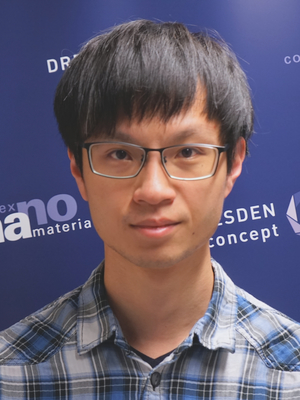


1. Understanding the working principles of single-molecule machines is of fundamental importance to develop nanoscale mechanical molecular devices. Investigations on how they interact with other molecules, external stimuli, and the surrounding environments are on-going focuses for their ability to produce useful work. In this talk, I will discuss three types of single molecule machines: molecule-gears, rotors, and nanocars adsorbed on the Au(111) surface by employing low-temperature scanning tunneling microscopy (LT-STM) under ultra-high vacuum (UHV) conditions. Not only as an imaging technique providing atomic resolution in real space, STM tip-induced manipulation is capable to locally trigger and investigate the different motion behaviors, and the corresponding fundamental excitation mechanism of the single molecules.
2. The control of low dimensional materials holds potential for revolutionizing the electronic, thermal, and thermoelectric materials engineering. Through strategic manipulation and optimization of these materials, unique properties can be uncover which enable more efficient and effective materials development. Towards the determination of nanoscale strategies to improve the electronic and phononic devices, computational simulations of modified low dimensional materials have been carried in this research. First, the electronic properties of chemically functionalized phosphorene monolayers are evaluated with spin-polarized Density Functional Theory, as a potential method to tune their electronic properties. The functionalization not only leads to formation of additional states within the semiconducting gap, but also to the emergence of local magnetism. The magnetic ground state and electronic structure are investigated in dependence of molecular coverage, lattice direction of the molecular adsorption and molecule type functionalization. Furthermore, the physical and transport properties of phosphorene grain boundaries under uniaxial strain are evaluated by the use of Density Functional based Tight Binding method in combination with Landauer theory. In both grain boundary types, the electronic bandgap decreases under strain, however, the respective thermal conductance is only weakly affected, despite rather strong changes in the frequency-resolved phonon transmission. The combination of both effects results in an enhancement in the thermoelectric figure of merit in the phosphorene grain boundary systems. Finally, the thermoelectric properties of carbon nanotubes peapod heterostructures are studied and compared to pristine nanotubes using also the Density Functional based Tight Binding method and Landauer theory. It is found that the fullerene encapsulation modifies the electron and phonon transport properties, causing the formation of electronic channels and the suppression of vibrational modes that lead to an improvement of the thermoelectric figure of merit. The results of this thesis highlight the potential of strategic manipulation and optimization of low dimensional materials in improving their unique electronic and thermal properties, revealing promising avenues for improving electronic and phononic devices.



1. Understanding the working principles of single-molecule machines is of fundamental importance to develop nanoscale mechanical molecular devices. Investigations on how they interact with other molecules, external stimuli, and the surrounding environments are on-going focuses for their ability to produce useful work. In this talk, I will discuss three types of single molecule machines: molecule-gears, rotors, and nanocars adsorbed on the Au(111) surface by employing low-temperature scanning tunneling microscopy (LT-STM) under ultra-high vacuum (UHV) conditions. Not only as an imaging technique providing atomic resolution in real space, STM tip-induced manipulation is capable to locally trigger and investigate the different motion behaviors, and the corresponding fundamental excitation mechanism of the single molecules.
2. The control of low dimensional materials holds potential for revolutionizing the electronic, thermal, and thermoelectric materials engineering. Through strategic manipulation and optimization of these materials, unique properties can be uncover which enable more efficient and effective materials development. Towards the determination of nanoscale strategies to improve the electronic and phononic devices, computational simulations of modified low dimensional materials have been carried in this research. First, the electronic properties of chemically functionalized phosphorene monolayers are evaluated with spin-polarized Density Functional Theory, as a potential method to tune their electronic properties. The functionalization not only leads to formation of additional states within the semiconducting gap, but also to the emergence of local magnetism. The magnetic ground state and electronic structure are investigated in dependence of molecular coverage, lattice direction of the molecular adsorption and molecule type functionalization. Furthermore, the physical and transport properties of phosphorene grain boundaries under uniaxial strain are evaluated by the use of Density Functional based Tight Binding method in combination with Landauer theory. In both grain boundary types, the electronic bandgap decreases under strain, however, the respective thermal conductance is only weakly affected, despite rather strong changes in the frequency-resolved phonon transmission. The combination of both effects results in an enhancement in the thermoelectric figure of merit in the phosphorene grain boundary systems. Finally, the thermoelectric properties of carbon nanotubes peapod heterostructures are studied and compared to pristine nanotubes using also the Density Functional based Tight Binding method and Landauer theory. It is found that the fullerene encapsulation modifies the electron and phonon transport properties, causing the formation of electronic channels and the suppression of vibrational modes that lead to an improvement of the thermoelectric figure of merit. The results of this thesis highlight the potential of strategic manipulation and optimization of low dimensional materials in improving their unique electronic and thermal properties, revealing promising avenues for improving electronic and phononic devices.